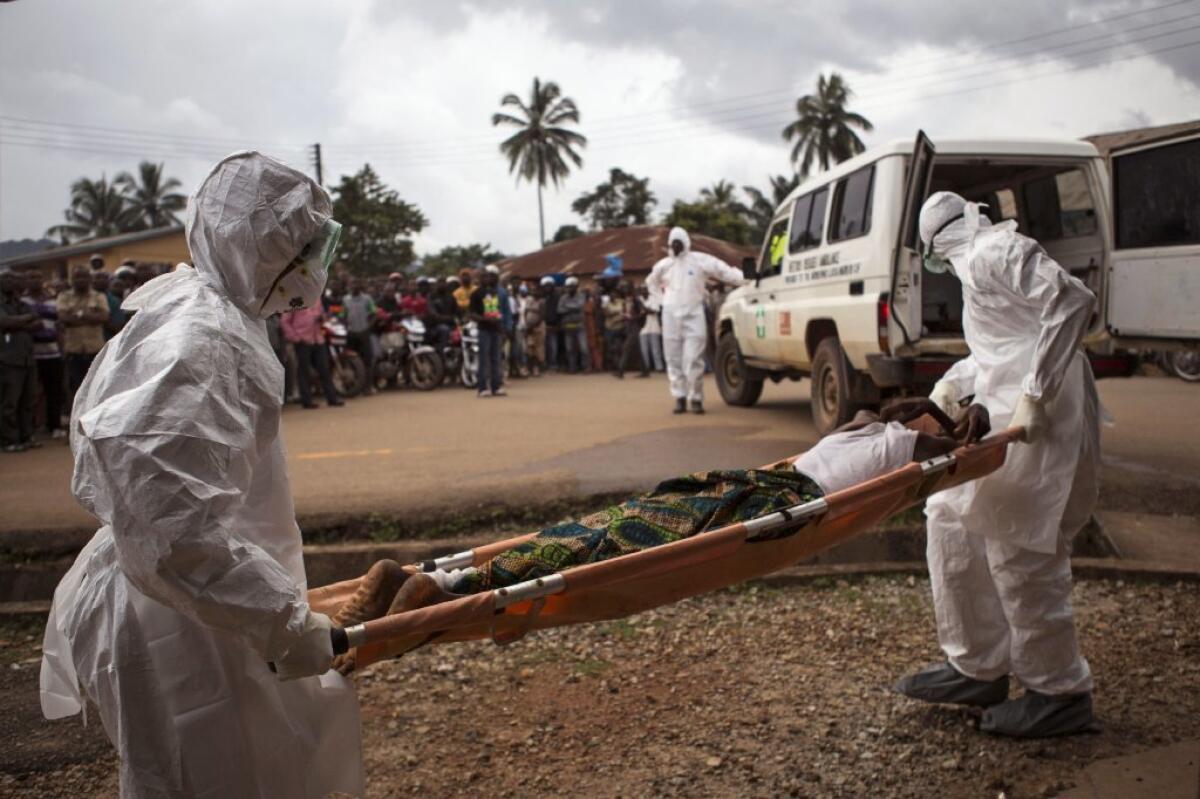Undetected Ebola infections suggest the disease spread more widely than thought

- Share via
As many as 25% of those infected with the Ebola virus during the recent four-year outbreak in West Africa may have experienced few if any symptoms and lived on without ill effects, new research suggests. Indeed, the immune systems of these people — the telltale sign of their infection — would allow them to withstand reinfection with the Ebola virus.
That finding has emerged from a study that tested 187 men, women and children in the rural village of Sukudu, Sierra Leone, where 28 of the West Africa outbreak’s roughly 11,000 Ebola deaths occurred. All of those tested for long-acting antibodies to Ebola had shared a home or public toilet with one or more of the 34 people who fell ill with Ebola in Sukudu.
Fourteen of the 187 Sukudu residents tested bore antibodies to Ebola, which strongly suggested that they had been infected, researchers found. Of those, only two reported they had suffered a fever, which did not bring them to the attention of physicians who were treating patients in the village. The rest reported none of the bleeding, fever, vomiting, diarrhea and muscle and headaches that killed close to 40% of those infected.
The testing took place a year after Ebola swept through Sukudu, which was considered a “hotspot” of viral transmission. The authors of the study included physicians from Partners in Health, a group that has been active throughout the world in disease prevention and treatment, and which dispatched many teams to care for Ebola-stricken communities in Africa. Stanford anthropologist Eugene T. Richardson led the effort.
The finding is likely to upend many of the conclusions that epidemiologists thought they had put in the bank about the outbreak. If one-in-four of the infected never showed significant symptoms, transmission was clearly wider than has previously been thought, and the virus’s “attack rate” — the rate at which exposure to a germ will lead to full-blown infection or death — will need to be revisited.
Such data points figure importantly in modeling patterns of viral spread and devising responses to future outbreaks of a virus. For now, the Ebola virus has ceased circulating among humans in Africa and elsewhere. But like most viruses that bubble up episodically and make people sick, Ebola is likely to be alive and well and living in populations of animals such as bats or monkeys. Given the right circumstances, some mutated form of the virus could reemerge, as it has several times since its discovery in 1976.
The authors of the study, published Tuesday in the journal PLoS Neglected Tropical Diseases, emphasize that the Sukudu findings do not necessarily reflect what happened across Liberia, Guinea and Sierra Leone during the outbreak. But they are highly suggestive.
“The findings provide further evidence that Ebola, like many other viral infections, presents with a spectrum of clinical manifestations, including minimally symptomatic infection,” the researchers wrote. “These data also suggest that a significant portion of Ebola transmission events may have gone undetected during the outbreak.”
The new finding is in line with a smattering of studies that have found evidence that not all patients respond to Ebola infection with debilitating or deadly illness. When the virus was first detected in 1976, epidemiologists believed some 19% of those infected do not get sick.
One key question is whether those who had virtually no symptoms of Ebola infection were in fact capable of spreading the virus. Physicians and public health authorities gleaned during the outbreak that patients were most likely to infect others when they were in the advanced stages of infection and immediately after they had died — a point at which West African customs dictated that loved ones touch and kiss the deceased.
If infected people with no symptoms were also capable of spreading Ebola — and if some who are infected do not get sick — Ebola’s reputation as an indiscriminate killer could be downgraded.
The new findings also may prompt reassessment of who is considered an Ebola “survivor,” a status that throughout West Africa has made affected individuals eligible for certain free social and medical support services.
“How we define a community of suffering is always problematic and should be revisited, given that this definition has implications for identity, stigma and access to social and medical services,” the authors wrote.
Follow me on Twitter @LATMelissaHealy and “like” Los Angeles Times Science & Health on Facebook.
MORE IN SCIENCE
Statins’ expanding reach falls short among women, minorities
Faster than a speeding swift: Bats beat birds at their own airborne game
Why are we ticklish? Scientists who tickled rats offer an intriguing answer




